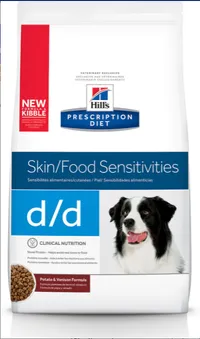Chicken allergy in dogs: Vet reveals everything you need to know
A chicken allergy in dogs is one of the most common food allergies. Here's how to handle it...

While still fairly uncommon, a chicken allergy in dogs can lead to a range of uncomfortable symptoms, including skin rashes and stomach upsets. If your pup is unlucky enough to be among the small percentage of pups with a digestive system that can't tolerate poultry, you're likely wondering what can be done about it.
However, before you go swapping your canine companion over to the best dog food for allergies, it's important to get a proper diagnosis from a vet.
That's because changing dog food needs to be done slowly and carefully to avoid upsetting the balance of bacteria in your dog's intestines. Once you know for sure that a chicken allergy is causing your pup's health complaints you can work with your vet to formulate a plan.
Below, Dr. Catherine Barnette explains the main symptoms of a chicken allergy and shares her favorite prescription foods for dogs who can't eat chicken. Plus, Dr. Hannah Godfrey outlines exactly how your vet will go about testing your fur friend for a chicken allergy so you know what to expect.

Dr. Barnette graduated from the University of Florida in 2006 where she received both her B.S. in Zoology and her Doctor of Veterinary Medicine (DVM). She has 15 years of clinical experience as a small animal veterinarian, treating dogs, cats, and occasional exotic patients. When she’s not writing content as a freelance veterinary writer, Dr. Barnette lives in southwest Florida with her husband and daughter (plus two cats, a dog, and a rescued dove!) and enjoys kayaking, biking, and hiking.

Dr Hannah Godfrey studied Veterinary Medicine at the Royal Veterinary College London. After graduating in 2011, Dr Godfrey went on to become a veterinary surgeon, conducting surgery consultations on a range of animals at a small independent practice in Cardiff, South Wales, UK. Dr Godfrey has a strong interest in soft tissue surgery. When she’s not helping animals back on their feet, Dr Godfrey writes a number of veterinary and animal-focussed articles.
What causes allergies in dogs?
"Allergies in dogs occur when their immune system overreacts to a substance, recognizing it as a threat when it is actually harmless," explains Godfrey. "The cells within the immune system will remember this substance and will continue to react if exposed to it in the future. Dogs can be allergic to almost any substance, but pollen, food allergies, and parasites are reasonably common."
Can dogs be allergic to chicken?
"Dogs can be allergic to chicken," Godfrey says. "Chicken is one of the most common food allergies in dogs, alongside beef and dairy products. However, to be allergic to chicken, their immune system must be familiar with the protein, so a dog must have eaten it at least once before."
Symptoms of chicken allergy in dogs

If you've been asking the question 'why is my dog itching, scratching, and biting himself constantly?', a food allergy may well be to blame.
Get the best advice, tips and top tech for your beloved Pets
Food allergies are often clinically indistinguishable from other types of canine allergies. There are four common allergies in dogs: dust mite allergy, environmental allergies (tree, weed, and grass pollen), flea allergy, and food allergy.
While there may be slight differences in the signs between these different types of allergies (for example, you may see visible fleas in a dog with flea allergies or you may notice seasonal signs in a dog with pollen allergies), it is nearly impossible to distinguish the cause of your dog’s allergies based on appearance alone.
In dogs, nearly all allergies manifest as irritation of the skin and ears (check out our guide to skin allergies in dogs for more on how a food allergy can affect the skin and coat). Common signs of dog allergies include:
- Generalized redness of the skin
- Itching
- Chewing at the paws
- Hair loss (generalized or patchy)
- Frequent hot spots or skin infections
- Scratching at the ears
- Recurrent ear infections
- Less commonly, food allergies may trigger gastrointestinal signs, such as vomiting and diarrhea.
If your vet suspects your dog has allergies, they will recommend an appropriate diagnostic workup to determine the cause of your pet’s allergies. This workup may include the consistent use of the best flea treatment for dogs (to rule out flea allergies), intradermal or blood allergy testing (to rule out environmental allergies), and a food trial (to look for evidence of food allergies).
In a food trial, you will be asked to feed your dog a hypoallergenic prescription diet for a period of 2-3 months. During that time, you will need to avoid all treats and table food, to ensure that your dog is not being exposed to any potential food allergens. If your dog’s signs resolve during the food trial, you and your veterinarian can safely assume that your dog’s allergies are caused by something in your dog’s diet.
Next, you will begin gradually reintroducing different food items, in an effort to determine which ingredients trigger an allergic response in your dog. If you feed chicken, for example, and your dog begins itching within 24 hours, you can safely assume that your dog is allergic to chicken.
Why are so many dogs allergic to chicken?
A chicken allergy is one of the three common food allergies in pets. Beef and dairy are the most common food allergy triggers in dogs, with chicken coming in at number three on that list.
Dogs can develop an allergy to any protein that they have eaten. Historically, most dog foods were made with beef as the primary protein source. Therefore, most canine food allergies were associated with beef, because that’s the protein that the immune system had “seen” the most often.
In recent years, however, an increasing number of chicken-based diets have been created, often marketed as “sensitive skin” or “sensitive stomach” foods. Therefore, veterinarians are seeing an increase in the number of dogs with chicken allergies. If kangaroo meat were to suddenly become a common ingredient in dog food, we would likely see an increasing number of dogs with kangaroo allergies. Dogs can develop a food allergy to any protein they have been fed.
If a dog is allergic to chicken, are they allergic to turkey?

Chicken and turkey are both poultry. There are enough similarities between these birds that some dogs with chicken allergies will also react to turkey. In fact, some dogs with chicken allergies will even react to duck.
However, this isn’t always the case. Some chicken-allergic dogs can eat turkey or duck with no problems. Therefore, you may need to experiment with a bit of trial-and-error in order to determine whether your dog can tolerate a turkey-based diet.
If you want to be on the safe side and minimize the risk of an allergic reaction, it is probably best to avoid feeding turkey to a dog that is allergic to chicken.
Diagnosing a chicken allergy
"Blood and skin prick tests can help diagnose a chicken allergy in your dog, but these tests can be costly and take some time," Godfrey explains. "They may also show inconclusive results, which can be frustrating. Eliminating chicken from your dog's diet completely for eight weeks (known as an elimination diet) can allow you to see whether your dog's symptoms improve, but this will only work if you check the ingredients on all of their food and treats."
Best food for dogs with chicken allergies
If your dog has chicken allergies, you will need to find a nutritious, balanced dog food that does not include chicken meat, chicken meal, or chicken by-products. You may opt to feed a prescription diet (under the guidance of your veterinarian) or search for an over-the-counter diet.
The most highly-restricted diets will be prescription diets as opposed to the best dry dog food and the best wet dog food that you can buy off the shelf. These include products like Hill's Prescription Diet d/d Skin/Food Sensitivities Potato & Venison Formula Dry Dog Food or Royal Canin Veterinary Diet Hydrolyzed Protein HP Dry Dog Food. Prescription allergy diets are manufactured on dedicated manufacturing lines, reducing the risk of cross-contamination, and careful attention to ingredients. Your veterinarian can help you select the most appropriate prescription diet for your pet.
You can also attempt to use an over-the-counter diet that does not contain any chicken, such as Purina Pro Plan Adult Sensitive Skin & Stomach Salmon & Rice Formula Dry Dog Food. Over-the-counter diets are often less expensive than prescription diets, which may make this an appealing option for some dog owners. Be aware, however, that these diets may be made on the same manufacturing lines that are used to create chicken-based diets. (This is why they are often less expensive.) Depending on the severity of your dog’s chicken allergies, even a small amount of cross-contamination may be enough to trigger an allergic reaction.
Purina Pro Plan Adult Sensitive Skin & Stomach Salmon & Rice Formula Dry Dog Food 30lb bag
$71.98 from Chewy
Made with real salmon as the number one ingredient, this delicious, high-protein food contains no artificial colors or flavors and is rich in omega-3 to support joint health.
Hill's Prescription Diet d/d Skin/Food Sensitivities Potato & Venison Formula Dry Dog Food 25lb bag
$139.99 from Chewy
With a single animal protein and single carbohydrate source, this tasty kibble includes a combination of clinically proven antioxidants helps maintain a healthy immune system and skin barrier function.
Royal Canin Veterinary Diet Hydrolyzed Protein HP Dry Dog Food 25lb bag
$134.99 from Chewy
Made with hydrolyzed protein for adult dogs with food sensitivities, this food is highly digestible and is enriched with EPA and DHA fatty acids to help maintain healthy skin.
How common are food allergies in dogs?
"It’s much more common for dogs to experience allergy symptoms due to environmental allergens like pollen from trees and plants, or parasites like fleas and mites than food allergens," Godfrey says. "While it’s not easy to control the symptoms caused by any allergy, it's easier to keep your dog away from food allergens than pollen and other environmental allergens."
A chicken allergy in dogs can be a frustrating condition, but there are ways to manage it successfully. Work with your veterinarian to accurately diagnose the underlying cause of your dog’s skin issues, then come up with an appropriate plan to minimize your dog’s exposure to foods that trigger an allergic response. With long-term efforts and maintenance, you can minimize the frequency of flare-ups and successfully reduce your dog’s signs of allergic dermatitis.
For more on what foods are safe for your canine companion to consume, check out our guide to what human food can dogs eat where a vet explains which foods you can share with your pooch.
Dr. Barnette is a graduate of the University of Florida, where she received both her B.S. in Zoology and her Doctor of Veterinary Medicine (DVM). She has 15 years of clinical experience as a small animal veterinarian, treating dogs, cats, and occasional exotic patients. She now works as a freelance veterinary writer, creating educational content for veterinarians, veterinary team members, and dedicated pet owners. Dr. Barnette lives in southwest Florida with her husband and daughter (plus two cats, a dog, and a rescued dove!) and enjoys kayaking, biking, and hiking. Learn more about Dr. Barnette at www.linkedin.com/in/catherinebarnette.




